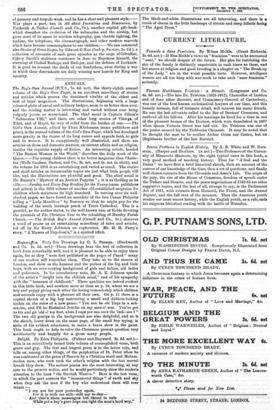Ragamuffins. Silty-five Drawings by G. L. Stampa. (Duckworth and Co.
2e. Gd. net.)—These drawings bear the test of collection in book form remarkably well, and it is pleasant to be able to enjoy them again, for as they " were first published in the pages of Punch" many of our readers will remember them. They take us to the streets of London, and show us the humour and the pathos of the big and little boys, with an ever-varying background of girls and babies, old ladies
and policemen. In his introductory note, Mr. A. E. Johnson speaks of the artist's " insight into the childish mind," and of his sympathy with the " humours of childhood." These qualities are indeed evident in this little book, and nowhere more so than on p. 24, where we see a boy and peppy giving each other the loving comradeship which children and anirnala enjoy with a pleasure all their own. On p. 11 there is a capital sketch of a big boy instructing a small and dUbions-looking urchin on the rules of a new game: "Yon can be ole Tirpz in a sub- marine, and FH be Hadmiral Jericho on my man-o'-war. You've got to try and git 'old o' my foot, afore I cops yer one over the 'cad—see P " The two old gossips in the background are also delightful, and so is
the sketch, lower down on the same page, of the small boy trying, in spite of his evident reluctance, to make a brave show in the game. This book ought to help to solve the Christmas present question very satisfactorily and happily for a great many people.
Delight. By Eden Phillpotts. (Palmer and Hayward. 3s. 6d. net.)— This is an attractively bound little volume of accomplished verse, both grave and gay. The first and longest poem is in the latter vein, and tells us, among other things, of the perplexities of St. Peter when he was confronted at the gates of Heaven by a Christian maid and Moham- medan man, who each took the other's religion with the last mortal breath they drew. The serious poems are the most interesting, at any
rate to the present writer, and he would particularly draw the reader's
attention to the lines " On Dawlish Warren." Here is the last verse, in which the poet answers the " immemorial things " of earth and sky when they ask the man if the boy who understood them will ever
return :-
" I cry not foryonr yesterday again, For it is with me still—still my to-day-
And time's stern messengers but threat in vain While yet a boy's pure hope can light the man's hard way."
The black-and-white illustrations are all interesting, and there is a touch of charm in the little landscape of stream and steep hillside facing " The Aged Trees."












































 Previous page
Previous page